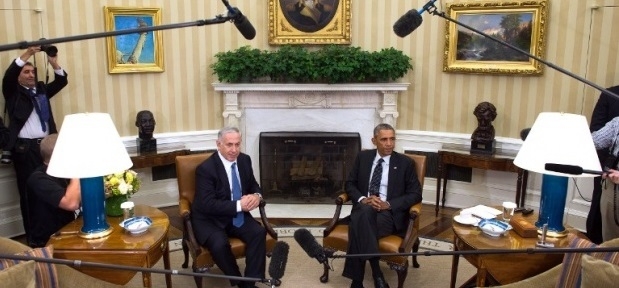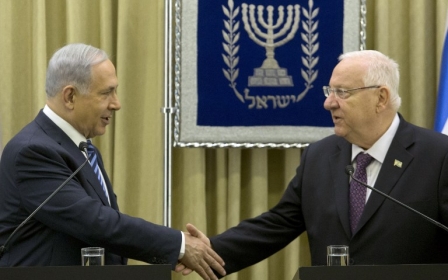Israel and the coalition of oppressors

Baltimore is burning, and Israeli Prime Minister Benjamin Netanyahu is putting his cabinet together.
The two events seem completely unrelated. One is the unrest in the streets of Baltimore after the killing of Freddie Gray, a 25-year-old African-American man who suffered mortal injuries while under police custody. The other is the prolonged effort of Netanyahu to form a coalition after winning elections last March. Yet a connection does exist between these two events, which can shed light both on the Israeli internal political impasse as well as on how Israeli politics and technology reach across the ocean and affect the lives of African Americans in the US.
Slow coalition building
The recent Israeli elections in March were early elections called by Netanyahu; the previous coalition lasted just under two years. Netanyahu called for the early election in order to increase his political power and win a bigger majority. He did just that, and indeed won a significant victory in the recent March elections. Netanyahu has many options for establishing a stable coalition, choosing which parties to leave out. Thus, the elections gave him flexibility and ensured his negotiating power with the various small Israeli parties, who are negotiating for a place in his coalition based on how many ministries and other perks they would receive in return.
There was no surprise that President Reuven Rivlin gave the task of forming the government to Netanyahu, but it is rather surprising that more than a month has passed and Netanyahu still has no coalition to present to the president. Why is it so difficult to form a government? One theory is that politicians simply take their time, but another possible explanation has to do with the efforts of Netanyahu to convince the Zionist Union party (formerly known as the Labor Party), or a fraction of that party, to join his coalition in order to give his coalition a moderate image. After the US announced that it would not defend Israel at the UN if the government was not committed to the two-state solution, Netanyahu has been desperately trying to form a government that will keep up the pretence that Israel will be willing (one day) to make compromises. So far, the Zionist Union has refused Netanyahu’s advances.
Yet Netanyahu isn’t the only one who has heard the threat from the US and who understands that the legitimacy of the Israeli regime is teetering on the brink in the eyes of the international community. His right-wing coalition partners are willing to say openly that they have no intention to allow a Palestinian state. Netanyahu himself made such a promise right before the election, and turned it around the day after, in a classic move of lying to the Israeli public and to the White House at the same time. But these right-wing politicians, such as Avigdor Lieberman, who seeks the Foreign Ministry portfolio, argue that Israel’s diplomatic strength will not come by acquiescing to the demands of the international community and ending the occupation, but rather by proving to the world that one can simply ignore international law.
Exporting oppression
Israel is one of the biggest arms exporters in the world, and has been known to export weapons to dictatorships, oppressive regimes and countries in the midst of civil war. Through its arms trade, Israel has in recent years formed close ties with Azerbaijan, Brazil, Georgia, India, Mexico, Nigeria and other countries. This is part of the plan of the Israeli right wing to realign the country's foreign policy away from the EU (which keeps insisting ever so meekly that Israel respect international law), and gain the support of regimes who look up to Israel’s militarism and ruthless nationalism. This policy has already borne fruit: the most recent application of Palestine to the status of statehood was shot down by Nigeria, which sits on the Security Council and chose to abstain, just as Israeli-made attack helicopters were about to be sold to Nigeria, in a deal that was blocked at the last minute by the US.
And the results are felt in Baltimore
The new coalition that will be formed in Israel will likely be the most right wing in Israel’s history, and it will have the “Nationality Law” high on its agenda, a law which will openly place democracy in a subservient place beneath Israel’s ethnic definition as a “Jewish” state. This doesn’t necessarily mean that Israel is expected to lose its friends in the West, though. Right-wing European politicians are jumping through hoops to show how pro-Israel they are, and are hoping to emulate Israel’s harsh policies against asylum-seekers from Africa. And the US's pro-Israel politics are not merely driven by a love for Israel, but are also reinforced with close military ties.
Many US police officers, including some from Baltimore, visit Israel to train in “anti-terrorism” techniques. They learn not only from Israeli police, but also from Israeli soldiers, how to control a hostile civilian population. In the eyes of Israeli soldiers, every Palestinian is a potential terrorist, a possible threat to the state of Israel. US police officers learn about the role of surveillance in invading the privacy of civilians, about constant readiness with lethal weapons for the slightest sign of unusual behaviour, and most importantly: about how to conduct racial profiling and divide human beings into categories based on their looks, accent, behavior and dress in order to classify the potential threat that they pose. When such a mentality is imported to the US, unarmed civilians begin to die at the hands of the police.
The wave of police brutality in the US in the last few months is a result of the militarisation of police in the US. In very few places around the world is the police force as militarised as it is in Israel. Israeli companies are eager to offer their expertise to the US police, and the Israeli government encourages this in order to gain international legitimacy for its continued oppression of the Palestinian population. In light of the growing influence of Israel’s military and security industry on police procedures around the world, it is no surprise that so many people in Ferguson, Baltimore and Brazil are adopting the slogan “We are all Palestinians.”
- Shir Hever is a graduate student at the Free University of Berlin, and an economist with the Alternative Information Centre.
The views expressed in this article belong to the author and do not necessarily reflect the editorial policy of Middle East Eye.
Photo: Israel's Prime Minister Benjamin Netanyahu meets with US President Barack Obama at the White House (AFP)
Middle East Eye propose une couverture et une analyse indépendantes et incomparables du Moyen-Orient, de l’Afrique du Nord et d’autres régions du monde. Pour en savoir plus sur la reprise de ce contenu et les frais qui s’appliquent, veuillez remplir ce formulaire [en anglais]. Pour en savoir plus sur MEE, cliquez ici [en anglais].





